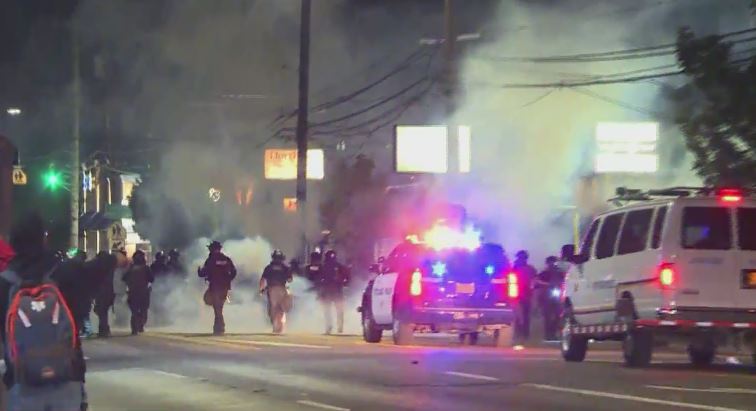PORTLAND, Ore. (KOIN) — The chief of Portland police on Tuesday took questions from the media about the ongoing civil unrest following three straight nights of riots in the city.
Portland Police Bureau Chief Chuck Lovell explained that the bureau’s methods in managing crowds come down to a “risk versus reward question: the interjection of police into that crowd, too, has its own dynamic that we’re really mindful of.”
Lovell said dozens of officers are retiring in the month of August and their absence creates challenges for staffing of events and normal response to calls.
“August has been a busy month for us as far as retirements,” he said. “We’ll have over 50 people who will have retired in the month of August and those are veteran officers who are out and able to take calls and do investigations. So we’re a lean agency. So we have to staff our resources as best we can.”
Simple fatigue adds to the strain of juggling staffing during the late-night protest events.
“The officers who are doing the crowd control who are out downtown around these buildings late at night — when this dissipates at 1 or 2 in the morning they are back out answering calls for service,” Lovell said. “So the same folks getting pelted with rocks and mortars, they are the same ones brushing off their uniforms and taking the welfare check, going to see about the domestic violence victim and things of that nature.”
PPB’s protest information and updates
The police chief was asked whether the bureau anticipates needing help from the National Guard.

“I think from time to time we need our partner agencies. The help of OSP has been huge; Multnomah County Sheriff’s Office has been a big help,” said Lovell. “I think right now we’re in a place where I feel like we can handle crowd control with our partners. But if that decision’s made down the road, that’s a decision that gets made above my head.”
Protesters marched to the Portland Police Association on North Lombard Street on Monday night — the 88th consecutive night of protests in the city. Police declared a riot within minutes of the protesters’ arrival and arrested 25 people overnight. Officers also used tear gas, saying it was prompted by fires being lit at the PPA building.
A riot was also declared Sunday night at North Precinct as protesters set off fireworks and lit awnings on the outside of the building on fire. The PPB said while the officers were working to extinguish the fire, they were hit with rocks thrown from the crowd. One lieutenant, they say, suffered a cut to his hand after being hit with a piece of ceramic. Officers used tear gas in an effort to disperse the crowd and arrested 23 people.
Police declared a riot Saturday night at the Penumbra Kelly Building, which includes offices for Portland police and the Multnomah County Sheriff’s Office, on the east side of the city. Protesters launched “a variety of items” at officers and police vehicles, including paintballs, and shined green lasers at officers, according to police. The riot declaration came after Portland police said officers were hit with “rocks, bottles and other dangerous objects.” Fourteen people were arrested that night.
Chief Lovell said the number of arrests officers make during an event “depends on our resources, the type of opportunities we have to make arrests, the energy and the activities of the crowd.” He also touched on the Multnomah County district attorney’s decision not to prosecute many protest-related charges, saying it’s the DA’s ultimate choice and officers will make arrests if there is criminal activity and “good charges.”
“I’d much rather spend the majority of my time talking about the future and about how Portland police can serve the community in a way that’s more connected and build trust and do those things but this is a huge resource drain both on people, on money over time — things of that nature — and just on focus,” said Chief Lovell. “I think for us, talking about the path forward is really what I think people who are really looking for police reform and the message of the initial movement was about and this crowd-control issue that we’ve been dealing with for three months.”